| Srl | Item |
| 1 |
ID:
181881
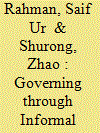

|
|
|
|
|
| Summary/Abstract |
In their post-authoritarian period, civilian governments in transitional democracies have often been battered by unelected power centers. Where do these unelected forces derive their power? This article addresses this question through a case study of Pakistan. Since the 2018 elections, a decade after leaving formal political office, the Pakistani military has asserted greater control over civilian government. Using the concept of informal institutions of political participation as an analytical framework, we argue that when formal forms of control become untenable due to legitimacy and/or functional constraints, the military turns into a Janus-faced institution, visibly acting as a formal state organ while invisibly protecting its institutional interests through what we call “informal mechanisms.” The article explains how Pakistan’s pre-2018 political situation dictated a quasi-military regime more suited to the military’s interests than direct military rule.
|
|
|
|
|
|
|
|
|
|
|
|
|
|
|
|
| 2 |
ID:
119399
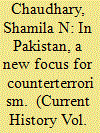

|
|
|
| 3 |
ID:
187467
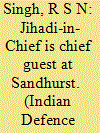

|
|
|
| 4 |
ID:
091806


|
|
|
|
|
| Publication |
2009.
|
| Summary/Abstract |
Several retired Pakistani military officer and soldiers have joined the Islamic militants who are now at war with their former institution.
|
|
|
|
|
|
|
|
|
|
|
|
|
|
|
|
| 5 |
ID:
115595
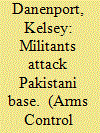

|
|
|
| 6 |
ID:
131890
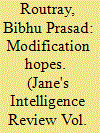

|
|
|
| 7 |
ID:
109054
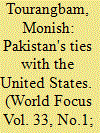

|
|
|
| 8 |
ID:
163243
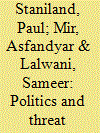

|
|
|
|
|
| Summary/Abstract |
Analysts and policymakers agree that the Pakistani military has engaged in selective repression of and collusion with armed groups. Yet beyond this general observation, fine-grained theory and evidence do not exist to systematically explain patterns of military strategy across groups and over time. This paper provides a theoretical framework for explaining regime perceptions of armed groups and the strategies state security managers pursue toward different types of groups. It then probes this framework using a combination of new medium-N data on military offensives, peace deals, and state–group alliances in Pakistan’s North West and four comparative case studies from North and South Waziristan. We argue that the Pakistani military—the key state institution in this context—has assigned armed groups to different political roles reflecting both their ideological affinity with the military and the operational benefits they can provide to the army. This mixture of instrumental and ideological motivations has created a complex blend of regime threat perceptions and state–group interactions across space and time. A clearer understanding of how the military views Pakistan’s armed political landscape can inform policy debates about the nature of Pakistani counterinsurgency, as well as broader theoretical debates about order and violence.
|
|
|
|
|
|
|
|
|
|
|
|
|
|
|
|
| 9 |
ID:
118492
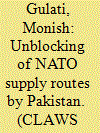

|
|
|